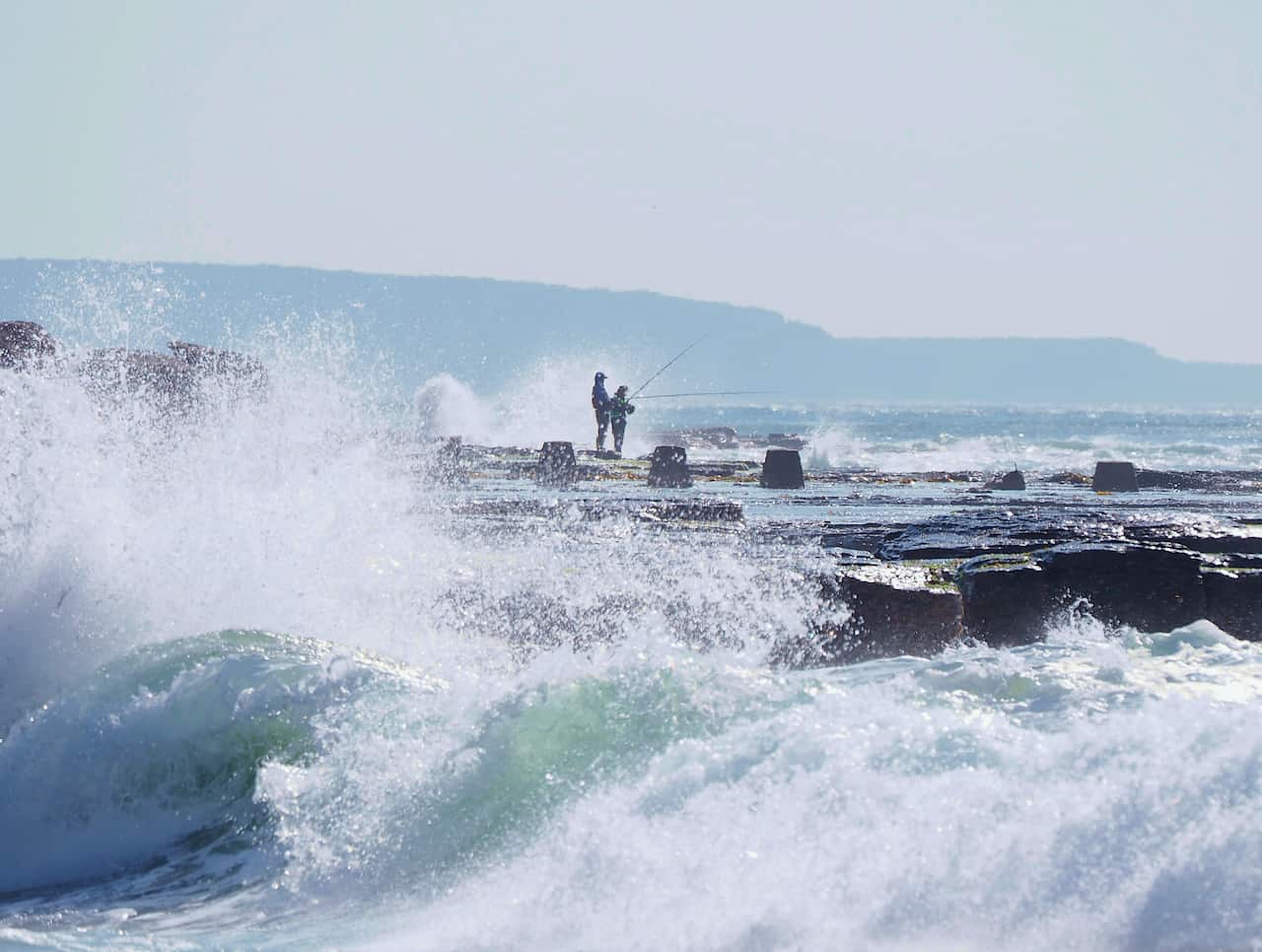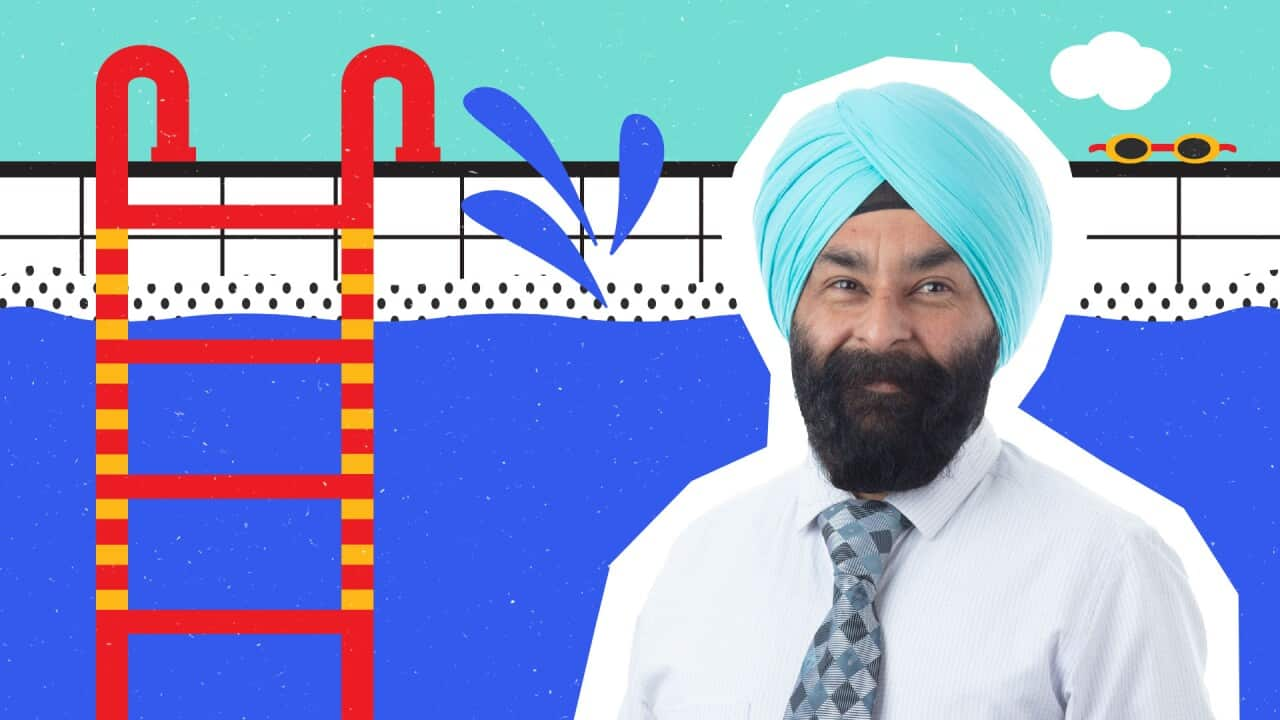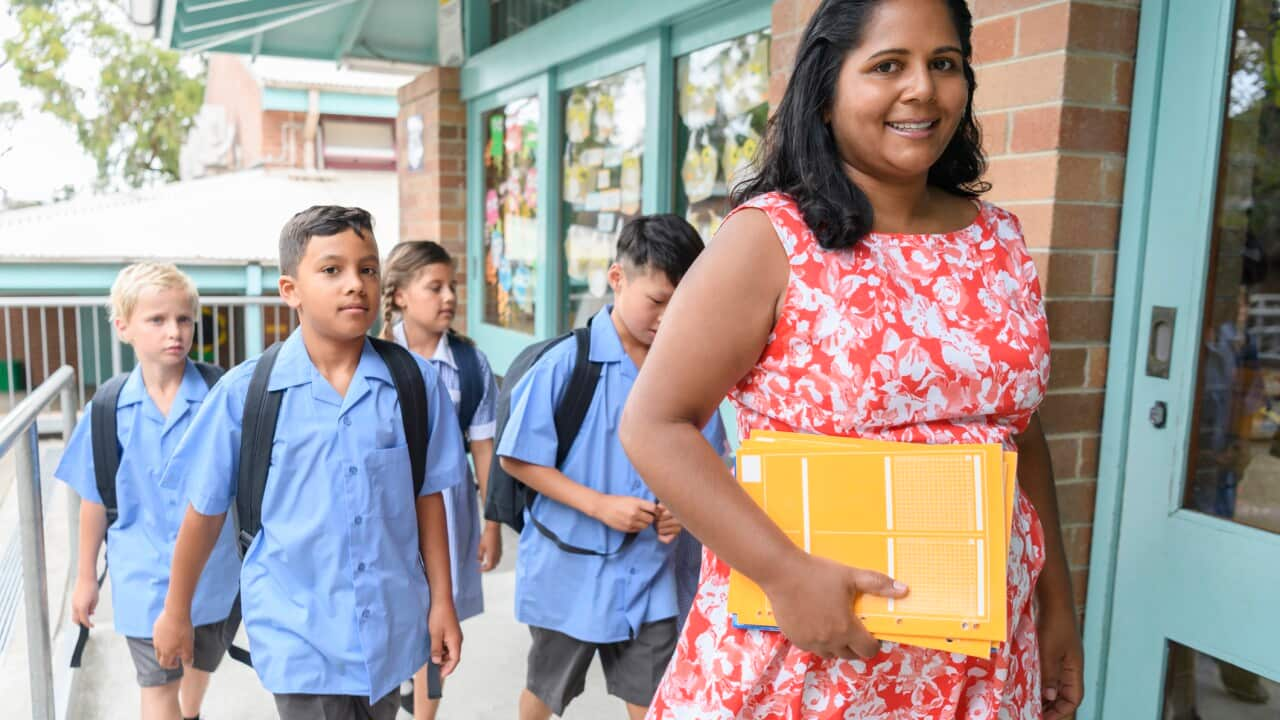Sashi Perera
We'd like to acknowledge the traditional owners of the land we're recording from. We pay our respects to the Wurundjeri Woi Wurrung people of the Kulin nation and their elders, past and present. We also acknowledge the traditional owners from all Aboriginal and Torres Strait Islander lands. You're
Surenja Amana
You really are right there amongst the elements. You have the waves coming in, washing against the rocks. Because of the water, the rocks become slippery, so it's quite easy to lose your footing often on the rock platforms. When you fall into the water, the water is often quite deep as well. And
then if you don't have the skills and knowledge of what to do if you do fall into the water, then often people will panic and not know what to do to get out of that situation.
Suren Jayemanne
I'm Suren Jayemanne I'm a second generation Sri Lankan Australian comedian, writer and actor. And I've never been too comfortable around the water.
Sashi Perera
I'm Sashi Perera. I'm also a second generation Sri Lankan Australian comedian and writer. But, but I love the water. Usually I'm the one being all enthusiastic in these episodes, but I have really little experience with fishing, so I'm learning along with you this episode.
Suren Jayemanne
This is Head Above Water, an SBS podcast where we explore water culture and water safety in Australia. If you're keen to hit the surf, cast a line or relax in the water surrounded by nature, this is the show for you.
Sashi Perera
Today we're going Rock fishing.
Suren Jayemanne
It's a well loved sport here in Australia, but it's especially popular among migrants from Asian countries.
Sashi Perera
Yeah, rock fishing is big in Asia, but it's quite different here in Australia, mainly because our surf tends to be much bigger and more powerful.
Suren Jayemanne
If you're thinking about giving it a crack, well, you'll need to know how to do it safely.
Sashi Perera
That's why I'd like you to talk to someone who has done a tonne of research on rockfishing.
Bernadette Matthews
With my role, I, will investigate drowning incidents that occur, particularly in Victoria, but also looking at trends nationally and internationally.
Suren Jayemanne
Dr. Bernadette Matthews is the head of Research Evaluation and Insights at, Life Saving Victoria and she's a researcher at Monash University. I've been exploring different types of environments, different types of water adventures in my quest to learn how to swim. And one thing that I'd never heard
of before starting this podcast was rock fishing. So can you tell us exactly what is rock fishing?
Bernadette Matthews
Probably in its simplest terms, it is as it sounds. So it's going fishing and fishing off a rock platform. So for some people, it might be from quite a distance over the rocks, so you might be sort of on the edge of a cliff. But for many people, and particularly around Victoria and the coastline in
Australia, it's going down on particular rock platforms and trying to catch a fish.
Suren Jayemanne
And so what draws people to the rocks? why are they fishing there rather than off a bridge or off the pier? You know, the normal places we'd expect.
Bernadette Matthews
Yeah. For some people, it's about the type of fish that they can catch. And at certain times of the year, there's different types of fish. For other people, it's about the adrenaline rush, because you are right in there amongst the elements and there's, you know, often high waves and that sort of
thing, which does make it dangerous, obviously. But mostly for people, it's about enjoying the activity and the types of fish that you're catching.
Suren Jayemanne
That's interesting. Cause it has been described as one of Australia's most dangerous sports, which is pretty scary. Cause we do have a lot of dangerous sports here. What does make it so dangerous?
Bernadette Matthews
Particularly on those rock platforms, you really are right there amongst the elements. So you have the waves coming in, washing against the rocks when the tide coming in, and that sort of side of things. It's quite easy to. Because of the water, the rocks become slippery. So it's quite easy to lose
your footing as well. Just that generally being quite close to the water. Often on the rock platforms, when you fall into the water, the water is often quite deep as well, so it's quite easy to lose your footing. And then if you don't have the skills and knowledge of what to do if you do fall into
the water, then often people will panic and not know what to do to get out of that situation.
Sashi Perera
So, Suren even though rock fishing can be dangerous, it must be quite a rush out there on the rocks. So many people are into this activity.
Suren Jayemanne
Yeah. Actually, Sashi, it. It kind of makes sense to me. Like, it sounds like such a fun activity. It's this perfect blend of, I don't know, peace and excitement. Like, you're out there. You have to be patient and you have to be kind of calm to catch the fish. But also you're sort of beholden to the
wildness of the ocean. And you. It's intense and you've got to be vigilant. It sounds like fun.
Sashi Perera
Imagine the bragging rights as well, because you imagine, like, catching a fish that you wouldn't even be able to get close to normally.
Suren Jayemanne
Yeah. Wow. I, would definitely put that in my profile picture, I mean, my family, we've never really talked about rock fishing, but I imagine if you grew up rock fishing somewhere back home, doing it here might feel like a nice way to kind of connect with your home.
Sashi Perera
Oh, never thought about the reconnecting with home angle. But wait, isn't rockfishing especially dangerous for migrants?
Suren Jayemanne
Yeah, I actually have heard that too. let's see what Dr. Bernadette Matthews reckons.
Bernadette Matthews
Yeah, we find that rockfishing is really popular for people from overseas and particularly from different Asian countries. we see in Victoria particularly high numbers of fatalities of people from, Chinese and Vietnamese communities. And part of that is because it is quite a popular activity for
people from those countries. And when they're fishing in those countries, the conditions are quite different. So the elements in Australia, and particularly along the coastal areas are really hazardous. And so they're potentially fishing in locations, or have been fishing in locations in other
countries that maybe not as dangerous. And so they're not necessarily aware of how dangerous it can be. And those localised conditions in Australia can be, so hazardous for them.
Suren Jayemanne
Okay, so it sounds like I need to be really well prepared before I, go rock fishing then. Let's start at home a few days before I head out. what should I be doing?
Bernadette Matthews
Really important to make sure you've got all the right equipment and the right gear before you're going. And so things like the number one thing you need to have is a life jacket. We have a lot of life jackets now that they're quite light and you know, for some people, they think a life jacket can
be really cumbersome and would inhibit them being able to fish. But there are a lot available now that are really nice and light and you can still, you know, fish with them on and feel quite comfortable. So the number one thing, make sure you've got a life jacket and that it meets the Australian
standards. Also make sure that you've got things like non slip footwear and bring something like a rope and a float in case you do get into trouble. Most definitely also make sure that you've got a friend or someone that you're going with you. So if you do get into trouble that they can assist, they
can call emergency services. And then you've got, as I say, a rope and something that floats you can throw out to the person as well. ideally, if you're wearing a life jacket, you won't need that, but it's great to have as much equipment as you can. The Other thing which would be really beneficial
is having, say, an emergency locator beacon, because often people will go rock fishing in quite remote locations. So if you want to get that emergency help straight away, being able to press that emergency response beacon will help make sure that emergency services get there as quickly as possible.
If you do get into trouble, tell someone where you're going and when you're going to be back as well, so that if you do get into trouble, if they don't hear from you by that certain time, then they can call for help.
Suren Jayemanne
That's a good list, extensive, but it sounds important.
Bernadette Matthews
The other thing to do is make sure you check the conditions before you go. So check the Bureau of Meteorology, check their website and look at what are the conditions going to be on the day? Where am I looking at going? What are the best places to go fishing, but also the safest places to go
fishing? There are a number of different locations where we really wouldn't advise people to go rock fishing. and the Victorian Fisheries Authority have some really great information on their website about places to go and those places that we wouldn't recommend you go, and those places as well,
where it is actually mandatory to wear a life jacket when you go rock fishing. So they've got a lot of really good safety tips as well as information on what's required when you go rock fishing.
Suren Jayemanne
Okay. And that, that kind of what Victoria has, you could see that replicated across the other states, generally.
Bernadette Matthews
Yeah, that's right, yeah.
Suren Jayemanne
So I've done all the research. I've checked the weather, on the BOM website for a few days and it looks like it's going to be great weather on the day. When the day comes up and, I pull up at my spot, what should I be doing now?
Bernadette Matthews
One of the first things I would do is to check for any signage around. So at the beach entrances and often in car parks, that sort of side of things, there'll be signage there, aquatic safety signage, and it'll tell you about the particular hazards at those locations. And there are also information
at those particularly hazardous sites for rock fishing, which will tell you about those hazards and also the requirements, again, if you need to be wearing a life jacket. So I would check the signage first. The other thing I would do would be to check the conditions of the water at the time. So the
waves often will come in sets, so you'll find that there will be higher waves and then they'll drop off and then. So they'll come in different sets and you might think, oh, it's looking quite nice, but then, you know, a few minutes later you'll actually get a higher set of waves. And so it's really
important to watch, have a look at the conditions, see how they see how much the water is coming in against the rocks and how far it's coming up on the rock ledge. And also check to make sure that there's an escape route. So if the waves do start coming in and they're coming in a lot higher and
closer to you than what you thought, make sure that there is a way that you can get out of there and get away from those higher wave sets as well. and the other thing is to make sure that when you are down on the rocks, to make sure that you don't turn your back on the waves, make sure you're always
watching, looking forward so that you're seeing what's going on in front of you.
Suren Jayemanne
It seems like a, lot of it is about learning and preparation so that you can understand the conditions. I'm guessing the first time I go rock fishing, I'm not going to be able to understand or read the sets straight away. How can I safely practise something like that?
Bernadette Matthews
So if you can get involved, with a fishing group, they often have fishing days and education sessions and that sort of thing. So they can tell you about, you know, the types of fish you can catch and, you know, what you might use as bait and all of those sorts of things. So you can learn about the
fishing conditions, but you can also. They'll teach you about the safety aspects as well, and the things to look out for.
Suren Jayemanne
Yeah, that's a great idea, actually, I guess, because then you join a community of people who, are experienced and can kind of show you firsthand.
Bernadette Matthews
Yeah. And it's a great way of meeting people, making connections and that sort of side of things as well, which I think, you know, is another great thing around fishing. You know, that's a bit of a community, so. Yeah, so there's those added benefits as well.
Suren Jayemanne
Now, say I am at the water rock fishing. The worst happens, I fall in the water, or my friend that I'm with falls in the water. Do you have advice for what we should do in that situation?
Bernadette Matthews
Yeah, the first thing, which is probably the hardest thing, is not to panic. So try and stay calm. So if you're in the water, ideally stay calm and try and float. So if you've got that life jacket on, that's going to be a lot easier. If you don't have A life jacket on. That's another thing to
probably have a look at and make sure that you've got those skills that you can, you know, how to float if you do get into trouble and then try and stay away from the rocks. So the waves will be sort of pushing you against the rocks, but it is actually better to move away from the rocks. And often
the currents can take you. If you try and swim across, the current will then bring you back in to the shore. So there'll likely be, say, a spot nearby which is safer and not against the rocks and so you can swim across and the currents will often naturally bring you back in. If that's not happening
though, again, float. Wave your arm to attract attention. So, try and call out for help and make sure you get that attention so that someone can ring 000 and get emergency services on the way.
Suren Jayemanne
That was so much great information, Bernadette. Thank you. if you had to give me the three headline items, the top three things to remember, what would you say?
Bernadette Matthews
First thing is to check the conditions before you go. Make sure you're wearing a life jacket at all times. And if you do get into trouble, don't panic. Float and wave your arms to attract attention.
Suren Jayemanne
That, that's Dr. Bernadette Matthews, the head of Research Evaluation and insights at Life Saving Victoria.
Sashi Perera
Wow. I have learned so much. What do you think your top takeaway is?
Suren Jayemanne
I thought it was so interesting how Dr. Bernadette was talking about when you go, rock fishing and arrive at your destination, it's good to kind of just sit in the car or sort of stand there and take in the weather conditions and like, really assess it and sort of almost become one with the water.
Sashi Perera
for quite a while as well. Like a half hour. I wouldn't have thought that you needed to watch it for that long.
Suren Jayemanne
Yeah, but I guess these places where people go rock fishing can be so treacherous. You really need to understand the lay of the sea.
Sashi Perera
and never turn your back on the water. like a bear.
Suren Jayemanne
Yeah, yeah, yeah, yeah. Never turn your back on the water. If you make it a promise, you better deliver on that Promise
Sashi Perera
In the next episode of Head Above Water, we're heading inland.
Suren Jayemanne
Inland? I thought this show's about water?
Sashi Perera
Inland waterways, mate.
Suren Jayemanne
Ah, you mean like, like rivers and gorges? That kind of thing?
Sashi Perera
Exactly. You'll meet a park ranger who can teach you about all the different types of inland waterways across Australia and how to enjoy them safely.
Park Ranger
You may not be aware of the risks when you come into contact with a water body, and part of my job is to ensure that whatever we have, whether it's pathways leading to the river, whether it's signage, whether it's our design in how that pathway hits the river, these are very, very important aspects
Suren Jayemanne
Head Above Water is a mini series of the SBS Australia Explained podcast. Are you new to Australia and need some help settling in? Whether you're after tips on travelling the country or talking to your neighbours, there's an episode of Australia Explained that can help. Just follow the show in your
Sashi Perera
And if you have any questions or topic ideas, send us an email. The address is australiaexplianed@sbs.com.au







